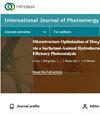A New Hybrid MPPT Based on Incremental Conductance-Integral Backstepping Controller Applied to a PV System under Fast-Changing Operating Conditions
IF 2.1
4区 工程技术
Q3 CHEMISTRY, PHYSICAL
引用次数: 12
Abstract
Maximum power point tracking (MPPT) is becoming more and more important in the optimization of photovoltaic systems. Several MPPT algorithms and nonlinear controllers have been developed for improving the energy yield of PV systems. On the one hand, most of the conventional algorithms such as the incremental conductance (INC) demonstrate a good affinity for the maximum power point (MPP) but often fail to ensure acceptable stability and robustness of the PV system against fast-changing operating conditions. On the other hand, the MPPT nonlinear controllers can palliate the robust limitations of the algorithms. However, most of these controllers rely on expensive solar irradiance measurement systems or complex and relatively less accurate methods to seek the maximum power voltage. In this paper, we propose a new hybrid MPPT based on the incremental conductance algorithm and the integral backstepping controller. The hybrid scheme exploits the benefits of the INC algorithm in seeking the maximum power voltage and feeds a nonlinear integral backstepping controller whose stability was ensured by the Lyapunov theory. Therefore, in terms of characteristics, the overall system is a blend of the MPP-seeking potential of the INC and the nonlinear and robust potentials of the integral backstepping controller (IBSC). It was noted that the hybrid system successfully palliates the conventional limitations of the isolated INC and relieves the PV system from the expensive burden of solar irradiance measurement. The proposed hybrid system increased the operational efficiency of the PV system to 99.94% and was found better than the INC MPPT algorithm and 8 other recently published MPPT methods. An extended validation under experimental environmental conditions showed that the hybrid system is approximately four times faster than the INC in tracking the maximum power with better energy yield than the latter.基于增量电导积分反步控制器的新型混合MPPT应用于快速变化工况下的光伏系统
最大功率点跟踪(MPPT)在光伏系统的优化中变得越来越重要。已经开发了几种MPPT算法和非线性控制器来提高光伏系统的能量产出。一方面,大多数传统算法,如增量电导(INC),对最大功率点(MPP)表现出良好的亲和力,但往往无法确保光伏系统在快速变化的运行条件下具有可接受的稳定性和鲁棒性。另一方面,MPPT非线性控制器可以缓解算法的鲁棒性限制。然而,这些控制器中的大多数依赖于昂贵的太阳辐照度测量系统或复杂且相对不太准确的方法来寻求最大功率电压。在本文中,我们提出了一种新的基于增量电导算法和积分反步控制器的混合MPPT。该混合方案利用了INC算法在寻求最大电源电压方面的优势,并提供了一个非线性积分反推控制器,该控制器的稳定性由李雅普诺夫理论保证。因此,就特性而言,整个系统是INC的MPP寻求势和积分反步控制器(IBSC)的非线性和鲁棒势的混合。值得注意的是,混合系统成功地缓解了隔离INC的传统限制,并减轻了光伏系统的太阳能辐照度测量的昂贵负担。所提出的混合系统将光伏系统的运行效率提高到99.94%,并被发现优于INC MPPT算法和其他8种最近发表的MPPT方法。在实验环境条件下的扩展验证表明,混合系统在跟踪最大功率方面比INC快大约四倍,能量产出率比INC高。
本文章由计算机程序翻译,如有差异,请以英文原文为准。
求助全文
约1分钟内获得全文
求助全文
来源期刊
CiteScore
6.00
自引率
3.10%
发文量
128
审稿时长
3.6 months
期刊介绍:
International Journal of Photoenergy is a peer-reviewed, open access journal that publishes original research articles as well as review articles in all areas of photoenergy. The journal consolidates research activities in photochemistry and solar energy utilization into a single and unique forum for discussing and sharing knowledge.
The journal covers the following topics and applications:
- Photocatalysis
- Photostability and Toxicity of Drugs and UV-Photoprotection
- Solar Energy
- Artificial Light Harvesting Systems
- Photomedicine
- Photo Nanosystems
- Nano Tools for Solar Energy and Photochemistry
- Solar Chemistry
- Photochromism
- Organic Light-Emitting Diodes
- PV Systems
- Nano Structured Solar Cells

 求助内容:
求助内容: 应助结果提醒方式:
应助结果提醒方式:


